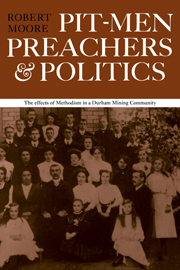Book contents
- Frontmatter
- Contents
- Dedication
- Acknowledgements
- List of abbreviations
- Introduction
- 1 Historical background
- 2 The Deerness Valley
- 3 The social and economic basis of paternalism: the colliery-owners in the Deerness Valley
- 4 Village Methodism – I
- 5 Village Methodism – II: the structure of the Methodist societies in the Deerness Valley
- 6 The respectable Methodists and the old Liberalism
- 7 The radicals and the Labour Movement, 1900–1926
- 8 Methodists in action: three political case studies
- 9 1970 – a postscript
- Conclusions
- Appendix I research strategy and techniques
- Appendix II the Methodist community and objections to Anglican union
- Appendix III the religious statistics
- Appendix IV occupational status, social mobility and the structure of Methodist leadership
- Notes
- Bibliography
- Glossary
- Index
8 - Methodists in action: three political case studies
Published online by Cambridge University Press: 24 November 2009
- Frontmatter
- Contents
- Dedication
- Acknowledgements
- List of abbreviations
- Introduction
- 1 Historical background
- 2 The Deerness Valley
- 3 The social and economic basis of paternalism: the colliery-owners in the Deerness Valley
- 4 Village Methodism – I
- 5 Village Methodism – II: the structure of the Methodist societies in the Deerness Valley
- 6 The respectable Methodists and the old Liberalism
- 7 The radicals and the Labour Movement, 1900–1926
- 8 Methodists in action: three political case studies
- 9 1970 – a postscript
- Conclusions
- Appendix I research strategy and techniques
- Appendix II the Methodist community and objections to Anglican union
- Appendix III the religious statistics
- Appendix IV occupational status, social mobility and the structure of Methodist leadership
- Notes
- Bibliography
- Glossary
- Index
Summary
So far we have examined the social characteristics of three groups of the community, the coal-owners, the old Liberal union leadership, and a younger group of radicals. We have also described the background to the situation in which they found themselves. This chapter is a discussion of three series of events, in which Methodists found themselves faced by situations in which they were required to translate their principles into pragmatic terms. The Deerness Valley Methodists were not much involved in day-to-day matters of national politics, but they were directly involved in three issues – or groups of issues. Firstly, the question of the activity of the state and religious liberty; secondly, war and the freedom of the individual conscience; and, thirdly, industrial and class conflict.
We have shown that Methodism is a form of inner-worldly asceticism. So now we discuss the relations of inner-worldly asceticism to the action of the Methodists by giving an account of their response to three situations: the 1902 Education Act and the 1904 Licensing Bill; the First World War – specifically the issue of conscientious objection; and the events of 1926.
1902 TO 1905: THE EDUCATION ACT AND THE LICENSING BILL
The period 1902–5 was one of unprecedented political agitation among Methodists. Two issues dominated the period: temperance and the Education Act of 1902.
The Conservative Government introduced a Licensing Bill in 1902 which tightened the laws against drunkenness.
- Type
- Chapter
- Information
- Pitmen Preachers and Politics , pp. 191 - 213Publisher: Cambridge University PressPrint publication year: 1974



